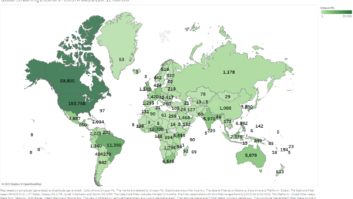This story has been updated to correct the bill’s sponsor information.
Without a change in federal law, songwriting as a profession could “give way to songwriting as a hobby.”
So says the National Music Publishers’ Association, backing a bill aimed at compensating songwriters, composers and publishers fairly for use of their work.
Rep. Doug Collins, R-Ga., introduced the Songwriter Equity Act. NMPA President/CEO David Israelite said the bill would help “inject fairness into a process that is undeniably stacked against songwriters and publishers.” He said roughly two-thirds of a songwriter’s income is heavily regulated, resulting in “devalued intellectual property rights.”
Music publishers complain that Section 115 of the Copyright Act predates the age of player pianos, yet effectively prohibits songwriters and music publishers from negotiating for use of their songs, “forcing well-below market rates … In 1909, Congress set a rate of 2 cents per copy. Today, more than 100 years later, that rate has increased to only 9.1 cents.” The Copyright Royalty Board, it said, currently must apply a below-market standard when determining mechanical royalties for songwriters and music publishers. Also, they say, another part of the act was supposed to protect songwriters but has had the opposite effect.
“This legislation would help restore what Congress originally intended — fair compensation for the public performance of a songwriter’s work. It allows the federal rate court to consider rates paid to recording artists for the performance of sound recordings over digital platforms — evidence that the court is currently prohibited by law from considering.”
The CEO of BMI, Michael O’Neill, said the bill would benefit 600,000 songwriters and music publishers represented by BMI. ”We are simply asking Congress to take the evidentiary blinders off of the judges who control a significant portion of our writers’ income from public performance and mechanical royalties.”
The Future of Music Coalition, an advocacy group for musicians, issued a statement by Interim Executive Director Casey Rae. He said songwriters often are overlooked in debates about business models and royalties.
“We are glad that the major publishers and their trade representatives are not pushing for the elimination of a compulsory licensing framework which gives songwriters and composers leverage that they otherwise would lack,” FMC continued. “It remains to be seen whether a ‘willing seller, willing buyer’ standard for rate setting is the best way to achieve parity in today’s royalty environment. Still, it is important for Congress to consider these matters, in addition to the glaring exemption that allows commercial radio to not pay performers and labels when their music is broadcast.” The latter issue is one that the U.S. commercial broadcast industry has resisted changing.
The NAB subsequently issued a statement opposing the bill; read it here.
Below is a press conference video posted by the National Music Publishers Association.












